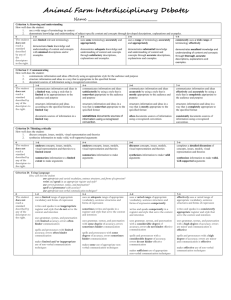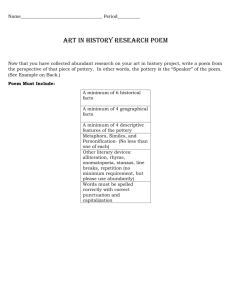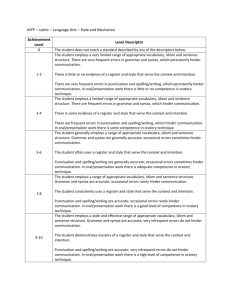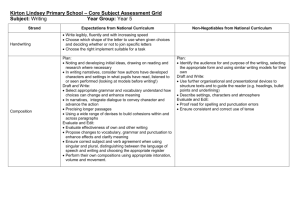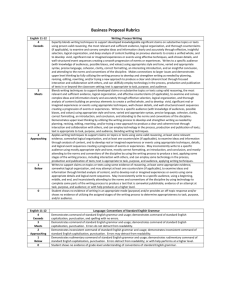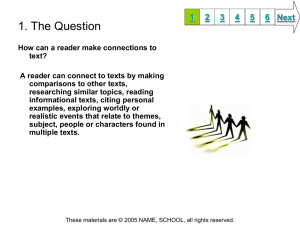journal project handout (student have these)
advertisement
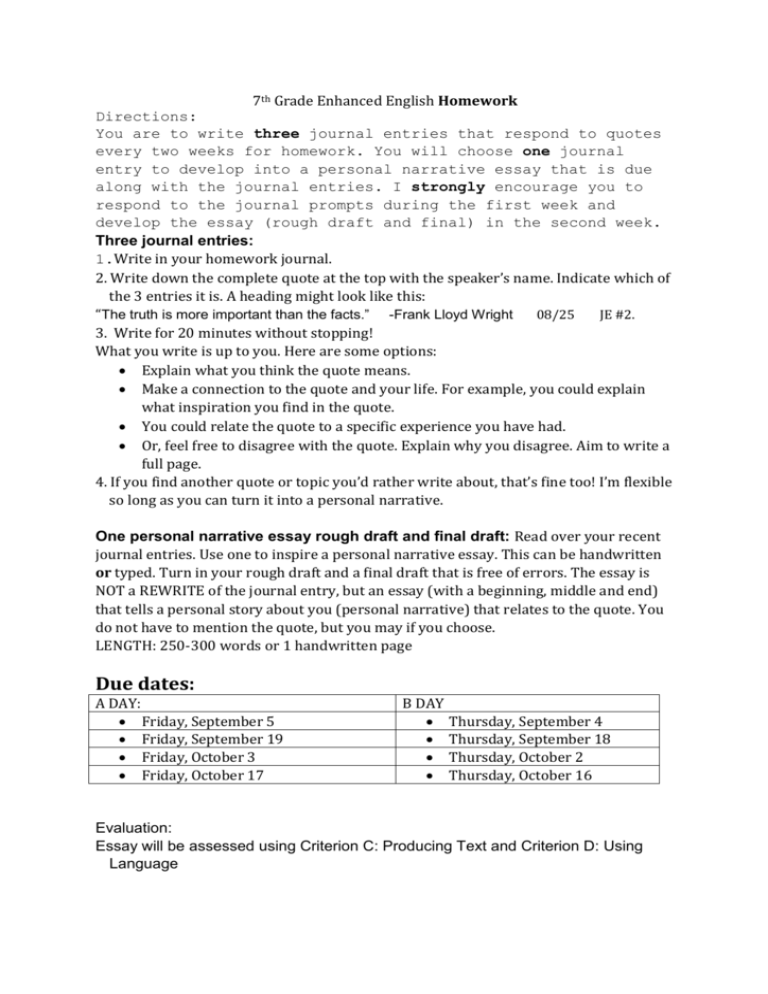
7th Grade Enhanced English Homework Directions: You are to write three journal entries that respond to quotes every two weeks for homework. You will choose one journal entry to develop into a personal narrative essay that is due along with the journal entries. I strongly encourage you to respond to the journal prompts during the first week and develop the essay (rough draft and final) in the second week. Three journal entries: 1.Write in your homework journal. 2. Write down the complete quote at the top with the speaker’s name. Indicate which of the 3 entries it is. A heading might look like this: “The truth is more important than the facts.” -Frank Lloyd Wright 08/25 JE #2. 3. Write for 20 minutes without stopping! What you write is up to you. Here are some options: Explain what you think the quote means. Make a connection to the quote and your life. For example, you could explain what inspiration you find in the quote. You could relate the quote to a specific experience you have had. Or, feel free to disagree with the quote. Explain why you disagree. Aim to write a full page. 4. If you find another quote or topic you’d rather write about, that’s fine too! I’m flexible so long as you can turn it into a personal narrative. One personal narrative essay rough draft and final draft: Read over your recent journal entries. Use one to inspire a personal narrative essay. This can be handwritten or typed. Turn in your rough draft and a final draft that is free of errors. The essay is NOT a REWRITE of the journal entry, but an essay (with a beginning, middle and end) that tells a personal story about you (personal narrative) that relates to the quote. You do not have to mention the quote, but you may if you choose. LENGTH: 250-300 words or 1 handwritten page Due dates: A DAY: Friday, September 5 Friday, September 19 Friday, October 3 Friday, October 17 B DAY Thursday, September 4 Thursday, September 18 Thursday, October 2 Thursday, October 16 Evaluation: Essay will be assessed using Criterion C: Producing Text and Criterion D: Using Language Some Possible Quotes to Respond To 1. The truth is more important than the facts. -Frank Lloyd Wright 2. Mistakes are part of the dues one pays for a full life. -Sophia Loren 3. Be ashamed to die until you have won some victory for humanity. -Horace Mann 4. Knowledge comes, but wisdom lingers. -Alfred, Lord Tennyson 5. Until I feared I would lose it, I never loved to read. One does not love breathing. -Harper Lee 6. Everyone thinks of changing the world, but no one thinks of changing himself. -Leo Tolstoy 7. The time to repair the roof is when the sun is shining. -John F. Kennedy 8. Nothing is too good to be true, too wonderful to happen, or too wonderful to ask. -Sir Anthony Hopkins 9.. It is easy to be popular. It is not easy to be just. -Rose Elizabeth Bird 9. For most of history, Anonymous was a woman. -Virginia Woolf 10. Where there is charity and wisdom, there is neither fear nor ignorance. -St. Francis of Assisi 11. Imagination is the highest kite one can fly. -Lauren Bacall 12. If you want a place in the sun, you’ve got to put up with a few blisters. -Abigail VanBuren 13. There is nothing like returning to a place that remains unchanged to find the ways in which you yourself have altered. -Nelson Mandela 14. The world is a looking glass, and gives back to every man the reflection of his own face. -William Makepeace Thackeray 15. The universe is transformation. Our life is what our thoughts make it. -Marcus Aurelius 16. A day without laughter is a day wasted. -Charlie Chaplin 17. Strength is born in the deep silence of long-suffering hearts; not amid joy. -Felicia Hermans 18. Who will tell whether one happy moment of love, or the joy of breathing or walking on a bright morning and smelling the fresh air, is not worth all the suffering and effort which life implies? -Erich Fromm 19. Treasure the love that you receive above all. It will survive long after your gold and good health have vanished. -Og Mandino Criterion C: Producing text Maximum: 8 Students should be able to: i. produce texts that demonstrate thought and imagination while exploring new perspectives and ideas arising from personal engagement with the creative process Achievement level 0 Level descriptor The student does not reach a standard described by any of the descriptors below. The student: produces texts that demonstrate limited personal engagement with the creative process; demonstrates a limited degree of thought or imagination and minimal exploration of new perspectives and ideas 1–2 The student: produces texts that demonstrate adequate personal engagement with the creative process; demonstrates some thought or imagination and some exploration of new perspectives and ideas 3–4 The student: produces texts that demonstrate considerable personal engagement with the creative process; demonstrates considerable thought or imagination and substantial exploration of new perspectives and ideas 5–6 The student: i. 7–8 produces texts that demonstrate a high degree of personal engagement with the creative process; demonstrates a high degree of thought or imagination and perceptive exploration of new perspectives and ideas Criterion D: Using language Maximum: 8 Students should be able to: i. use correct grammar, syntax and punctuation ii. spell with accuracy Achievement level 0 Level descriptor The student does not reach a standard described by any of the descriptors below. The student: i. uses grammar, syntax and punctuation with limited accuracy; errors often hinder communication ii. spells with limited accuracy; errors often hinder communication 1–2 The student: i. uses grammar, syntax and punctuation with some degree of accuracy; errors sometimes hinder communication ii. spells with some degree of accuracy; errors sometimes hinder communication 3–4 The student: i. uses grammar, syntax and punctuation with a considerable degree of accuracy; errors do not hinder effective communication ii. spells with a considerable degree of accuracy; errors do not hinder effective communication 5–6 The student: 7–8 i. uses grammar, syntax and punctuation with a high degree of accuracy; errors are minor and communication is effective ii. spells with a high degree of accuracy; errors are minor and communication is effective iii. makes effective use of appropriate non-verbal communication techniques. Name__________________________________________ DATE__________________________________________ PERIOD________________________________________ Criterion C: Producing Text Criterion D: Using Language O The student does not reach a standard described by any of the descriptors below. 0 The student does not reach a standard described by any of the descriptors below. 1-2 1-2 produces texts that demonstrate limited personal engagement with the creative process; demonstrates a limited degree of thought or imagination and minimal exploration of new perspectives and ideas i. ii. 3-4 produces texts that demonstrate adequate personal engagement with the creative process; demonstrates some thought or imagination and some exploration of new perspectives and ideas i. ii. uses grammar, syntax and punctuation with some degree of accuracy; errors sometimes hinder communication spells with some degree of accuracy; errors sometimes hinder communication 5-6 i. ii. 7-8 produces texts that demonstrate a high degree of personal engagement with the creative process; demonstrates a high degree of thought or imagination and perceptive exploration of new perspectives and ideas spells with limited accuracy; errors often hinder communication 3-4 5-6 produces texts that demonstrate considerable personal engagement with the creative process; demonstrates considerable thought or imagination and substantial exploration of new perspectives and ideas uses grammar, syntax and punctuation with limited accuracy; errors often hinder communication uses grammar, syntax and punctuation with a considerable degree of accuracy; errors do not hinder effective communication spells with a considerable degree of accuracy; errors do not hinder effective communication 7-8 i. ii. uses grammar, syntax and punctuation with a high degree of accuracy; errors are minor and communication is effective spells with a high degree of accuracy; errors are minor and communication is effective
